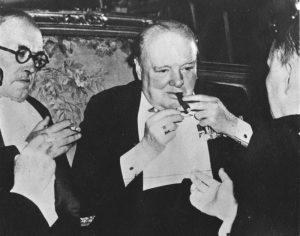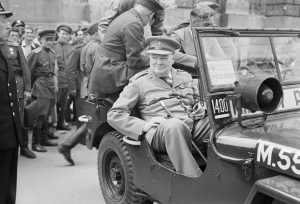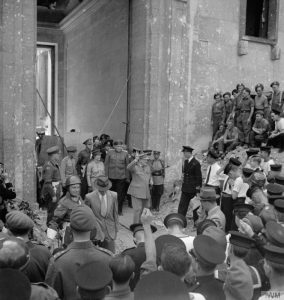
Finest Hour 163
Action This Day – Summer 1889, 1914, 1939, 1964

Winston Churchill, Parliament Square, London © Sue Lowry & Magellan PR
February 6, 2015
Finest Hour 163, Summer 2014
Page 38
By Michael McMenamin
125 YEARS AGO
Summer 1889 • Age 14
“I am rather shaky”
Winston’s concussion was described as “slight” by Harrow medical adviser G.C. Briggs, who said that he was put to bed “and will require careful watching for a few days.” Today, we know that even mild concussions are not to be treated lightly. Neither of Winston’s parents visited him at Harrow while he was bedridden, not for lack of requests. On 22 June his nanny, Mrs. Everest, arrived and Winston thanked his mother “for letting Woom come down.” Having mentioned that “I do not feel very fit,” he added: “Can’t you come instead—I was rather disappointed at not seeing you as I fully expected to.”
Once again, Winston’s pleas fell on deaf ears but Mrs. Everest came again the next day. He wrote to his mother: “Thanks awfully for letting Woom come down today. Both Doctor & Nurse say that they think I shall need a rest. I hope, most excruciatingly, that I do come home. Do come tomorrow….I am very delighted at the idea of coming home.”
By June 25th, almost a week after his concussion, Winston wrote his mother: “Woomany says I am looking so fresh and well today.” But he himself added: “I am very tender all over my body…I hope you will excuse my writing as I am rather shaky.”

2024 International Churchill Conference
Later that summer there was an outbreak of measles at Harrow and many parents took their sons out of school. Winston wrote to his mother asking to be sent home as well. “300 Boys have gone, 32 out of our house alone. I have never had the measles. But I would so like to come home. There will be about 5 boys left on Monday…I should have imagined that as 300 Mamas & Papas like to have their ‘offspring’ home You would like to have me. Please, please do.” He then went on helpfully to draft a wire to his mother for her to send to Head Master Welldon: “I have remembered that Winston has not had measles so please allow him to come this evening.” He added: “I can sleep anywhere. Do please, as all the friends I have made have gone, & it isn’t very nice to see them all going.”
100 YEARS AGO
Summer 1914 • Age 39
“Commence hostilities….”
As war loomed in Europe, Churchill took steps to make sure the Admiralty was ready for any eventuality. He reported on these measures to the King on 28 July:
1) The First Fleet will sail secretly tomorrow for its preliminary Northern Station.
2) The Second Fleet will assemble at Portland.
3) The Patrol flotillas [are at] full strength and are moving…to war stations.
4) The Irish blockades have been abandoned.
5) Aircraft are collected at…the Thames to guard against airship attack.
6) Oil tanks & magazines [are] guarded…
7) The reserves of oil & the coal arrangements are satisfactory.
8) The reserves of ammunition show large surpluses.
9) The torpedo reserve is complete.
10) [N]o deficiency of officers on a complete mobilization…at least 20,000 reservists.
On the same day, Churchill wrote his wife a letter which contains a well-known passage often cited to prove he was a warmonger: “Everything tends towards catastrophe & collapse. I am interested, geared up and happy. Is it not horrible to be built like that?” Usually omitted is what followed: “Yet I wd do my best for peace, & nothing wd induce me wrongfully to strike the blow.” He concluded urging privacy in phone calls: “…this is a vy good plan of ours on the telephone…But talk in parables—for they all listen.”
Less than a week later, on August 3rd, German troops crossed into France and Belgium. Britain’s ultimatum to Germany expired at midnight on 4 August, whereupon Churchill sent a signal to the Royal Navy: COMMENCE HOSTILITIES AGAINST GERMANY.
75 YEARS AGO
Summer 1939 • Age 64
“Winston is back”
Prime Minister Chamberlain had apparently learned nothing from Munich. Notwithstanding that Hitler had never held the Sudeten plebiscite he had promised, and had swallowed the rest of Czechoslovakia earlier in the year, Chamberlain told Lord Camrose on July 3rd he “had not yet given up hopes of peace.” Earlier that day, Camrose’s Daily Telegraph, like many other leading publications, had urged Chamberlain to bring Churchill into the government: “No step would more profoundly impress the Axis Powers with the conviction that this country means business.” The Prime Minister disagreed, writing to his sister that refusing to send for Churchill did not mean abandoning the idea of convincing Hitler “that it would not pay to use force….In fact, I have little doubt that Hitler knows quite well that we mean business.”
If the dictators just had patience, Chamberlain went on, “I can imagine that a way could be found of meeting German claims while safeguarding Poland’s independence and Economic Security. I am thinking of making a further proposal to Musso that he should move for a twelve months truce to let the temperature cool down.”
It wasn’t just the English press that wanted Churchill. On July 6th, Foreign Secretary Lord Halifax had received reports from several sources of conversations with Count Schwerin von Krosigk, Germany’s Minister of Finance and Hitler’s longest-serving cabinet member. A non-Nazi whose relatives were later involved in plots against Hitler, von Krosigk had been appointed by Hitler’s predecessors. The Count told two British military figures: “Churchill is the only Englishman Hitler is afraid of. He does not take the PM and Lord Halifax seriously, but he placed Churchill in the same category as Roosevelt. The mere fact of giving him a leading ministerial post would convince Hitler that we really meant to stand up to him.” Von Krosigk later said: “Hitler thinks Churchill is the only dangerous Englishman” and might make Hitler “realize that Great Britain really intends to fight if there is any further aggression.”
Churchill, meanwhile, was publicly urging an alliance between Britain, France and Russia, but the Prime Minister would not contemplate one. “I am so skeptical of the values of Russian help,” he wrote his sister in early July “that I should not feel that our position was worsened if we had to do without them.”
By July 23rd Chamberlain was sure Hitler had realized “the time is not ripe for the major war. Therein he is fulfilling my expectations. Unlike some of my critics I go further and say the longer the war is put off the less likely it is to come at all as we go on perfecting our defences and building up the defences of our allies.”
The next day at Chartwell, Churchill told General Ironside that it was “too late for any appeasement….Hitler is going to make war.” WSC predicted “the crippling or annihilation of Poland” and a German alliance with Russia. A month later, on 23 August, Germany and Russia signed a non- aggression pact. Eight days after that, Germany invaded Poland.
On that same day, September 1st, Chamberlain asked Churchill to join a small war cabinet as minister without portfolio. Churchill agreed. For the next forty-eight hours he heard nothing more as Chamberlain continued to battle reality. On the 2nd, as the terror bombing of Warsaw approached its second day, the PM told Parliament: “If the German Government should agree to withdraw their forces, then His Majesty’s Government would be willing to regard the position as being the same as it was before the German forces crossed the Polish frontier,” and “open to discussions” between Germany, Poland and Britain.
As he had at Munich, Chamberlain had not advised the Cabinet of what he intended to do or say. Then, the Cabinet had acquiesced. Now, they rebelled. Aghast at his statement, five ministers went to see him to insist on an ultimatum to Germany, which in due course was sent on the morning of 3 September. Hitler ignored the ultimatum and, thereafter, Chamberlain broadcast to the country that they were at war with Germany.
Later that day, Chamberlain again contacted Churchill to make a new and more specific offer: the Admiralty, with a place in the war cabinet. Churchill accepted at once, which led in due course to an alleged signal to the Fleet, which official biographer Martin Gilbert has alas been unable to track: WINSTON IS BACK.
50 YEARS AGO
Summer 1964 • Age 89
“Congratulations and Happiness”
Churchill’s grandson and namesake Winston was married June 27th. He was unable to attend the wedding so the newlyweds visited him at 28 Hyde Park Gate later that day. Winston wrote to his mother:
“I paid a visit to Grandpa C who has been ill for the last ten days, but today he was in spanking form. He was sitting looking at a book of sculpture in the garden of 28 HPG. It was a lovely sunny afternoon and he greeted me with the words ‘Congratulations and Happiness.’”
A month later, on July 27th, Churchill visited the House of Commons for the last time. The next day, Prime Minister Sir Alec Douglas-Home and Labour leader Harold Wilson led a delegation to Hyde Park Gate to presented him with a unanimous resolution on the occasion of his forthcoming retirement: “That this House, putting on record its unbounded admiration and gratitude for his services to Parliament, to the nation and to the world, remembers, above all, his inspiration of the British people when they stood alone, and his leadership until victory was won.”
Subscribe
WANT MORE?
Get the Churchill Bulletin delivered to your inbox once a month.




